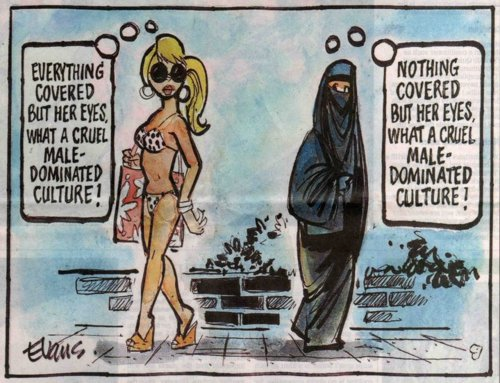Another topic Afshan talked about is the depiction of Muslims in the Disney movie Aladdin, in which the villain also named Jafar is represented more closely to the image of a Muslim than the main characters who are depicted as Americanized to relate to the viewers but in doing so stigmatizes the true Muslim image. Jasmin in this movie is also not depicted in a traditional burqa and instead seems to wear a belly dancer's outfit, showing off her flared hips and impossibly small waist. In the Opening song of the movie they comment on how barbaric the setting is and how your ear will be cut off if they don't like your face. They later changed it to commenting on the desert but kept the barbaric portion due to complaints.
Original Lyrics: Oh I come from a land, from a far away place, where the caravan camels roam. Where they cut off your ear if they don't like your face, it's barbaric, but hey, it's home. When the wind's from the east, and the sun's from the west and the sand in the glass is right; come on down, stop on by, hop a carpet and fly to another Arabian night. Arabian nights, Like Arabian days more often than not are hotter than hot, in a lot of good ways. Arabian nights, 'neath Arabian moons, a fool off his guard could fall and fall hard, out there on the dunes.
New lyrics: Oh I come from a land, from a far away place, where the caravan camels roam. Where it's flat and immense and the heat is intense, it's barbaric, but hey, it's home. When the wind's from the east, and the sun's from the west and the sand in the glass is right; come on down, stop on by, hop a carpet and fly to another Arabian night. Arabian nights, Like Arabian days more often than not are hotter than hot, in a lot of good ways. Arabian nights, 'neath Arabian moons, a fool off his guard could fall and fall hard, out there on the dunes.
Original Song
After this discussion she moved to another point of interest involving National Geographic. In 1984 Steve McCurry photographed a young Afghan girl who would later become famous in 1985, though no one would know her name for 17 years. National Geographic commented on her eyes and how haunting and haunted the girl was from years of war, though in reality she was pissed that some random white guy was taking a photo of her when she clearly did not want to be photographed. The person who benefited from this photo was McCurry, not the girl that he so rudely photographed and this went on for 17 years until he was asked to go find her. Through eye and jaw analysis the girl was eventually found. Sharbat Gula is her name, now around 30 and she was a victim of generalization by foreigners.
Take this article with a grain of salt.
http://ngm.nationalgeographic.com/2002/04/afghan-girl/index-text
When we think of the burqa we tend to think that women who wear them do not like to, and that they would prefer to be free like many of us Americans, to wear what ever they choose. But in reality they choose to wear their burqas. It is another part of their culture, a part of themselves that they show proudly. Afshan went on to say that our view on what is right is not always right and that other cultures such as the Muslims have different view points.
Overall this lecture was very eye opening to the views of Muslim women in this country and how the media likes to make it American friendly, even if the process strips the truth, poisoning our views on what really is the Muslim way of life.
Afshan Jafar
http://uvenus.org/editorial-collective/afshan-jafar/


No comments:
Post a Comment